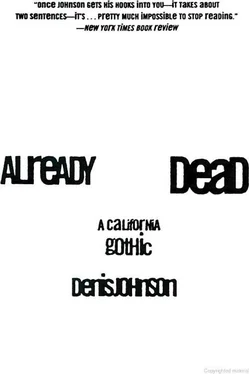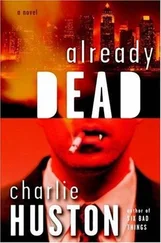At the Stewart Point Store he decelerated, drawn by the vision of a soft-drink machine in the parking lot, and pulled in next to a Highway Patrol car and went inside to change a five. The customers in the quiet establishment were already getting plenty of the law, what with the active presence of the CHP: a patrolwoman in a white, visored helmet whom Navarro, if he hadn’t seen the cruiser out front, would have taken for a fake, an impostor, nosing over everybody’s shoulder in the place and giving one traveller the lowdown on parking, or the placement of the registration sticker on the license plate or some such petti-ness — Navarro didn’t quite hear, didn’t want to. There were such charlatans, he’d arrested one himself one day in Englewood, an LAPD-uniformed high school music teacher directing traffic skillfully, but without authority…Navarro thought, Lady, I don’t wanna know you ever, as she came toward him
Already Dead / 275
nudging the brim of her helmet back with her baton, and he continued by thinking, You pompous bulldyke. He was embarrassed by, but nevertheless loyal to, such officers. We all started out okay. Citizens did this to us. “You from Mendocino County?” she asked.
“Point Arena. Just getting a Coke,” he explained.
“I’ve got an abandoned vehicle reported on the west side of the West Point — Gualala road. Fifty yards north of Pepperwood Creek, about a hundred yards into the brush.”
“You going up to check it out?”
“It’s just your side of the Mendocino boundary.”
“Well, I never did know where they put that line.”
“Beg pardon.”
“I don’t know one county from another, Officer, except where you cross the river. Can you point me on a map?”
“Let’s get out on the porch where I can spread her out,” the patrolwoman said.
The Gualala River constituted the county line for a distance of some four miles, to where the river jogged south along the San Andreas Fault and the boundary hooked straight east, crossing Big Pepperwood Creek and continuing on into the hills. Several creeks, none of them marked by signs, descended over the north-south ridge. Navarro kept count of the culverts passing beneath the road and drove directly to the spot and found the Silverado as it had been reported, obviously intentionally hidden, driven deep into the tangled chaparral, the camper’s aluminum roof just visible above the overgrowth. The low scrub it had broken through on the way to its parking place had grown back almost entirely; he locked up at the roadside and followed the ancient traces of entry beside the Pepperwood, finding it tough going along this way. The spot lay in the calm and the heat, several miles inland and a good half mile, he guessed, above the sea. The creek ran full and fresh. Just to be near it cooled him.
The fisherman who’d come across the vehicle had marked the way with shreds of his red bandanna, and with his last marker had unnecessarily draped the camper’s latch itself. The truck hadn’t been vandalized, but had waited here untouched for quite a while — peering into the driver’s window Navarro saw a ball of twigs and grasses, mustered here by some rodent, he assumed, down among the pedals.
The camper too was full of such nests, and spiderwebs, and piles of 276 / Denis Johnson
grain collected by mice, and a military-style rucksack and a duffel and assorted gear for outdoor living, and many curled gray marijuana leaves, and the carcasses of two dogs. The animals had perished of thirst or exposure. The heat had baked and dried them. Critters had gone at their innards. Papier-mâché dogs, half-molded and abandoned, their muzzles shrunken and baring all their teeth back to the last dry brown molars.
He shut the camper’s door and latched it. To get at the doors in the cab he had to break and trample down a lot of branches that had grown against them.
In the cab, on the passenger’s side, he found the white California Board of Franchise envelope. The mice had gotten to one corner. He realized he shouldn’t be handling it. Standing beside the open door, he used the bit of signifying bandanna to shield the dashboard from his own fingerprints as he supported himself by a hand on the dash and jabbed the glove box’s button with his ballpoint pen. He took the docu-ments there by the corners, one at a time and gingerly, between the tips of his thumb and finger, pushed the door shut with his pen, and went back through the brush to the road.
He intended merely to transfer these papers — the truck’s registration and a mileage log of some sort — to his cruiser’s front seat and then return to complete his investigation. But I’m no woodsman, he suddenly remembered, considering that an exploration of the whole scene was probably in order now. The vehicle had been hidden for a purpose.
Whatever had developed for its occupants had been unforeseen, and maybe permanent. Dogs, live ones, would have to nose around now before the truck itself was again disturbed. They might turn up blood-stains or bullet casings or a grave scratched in the dirt. He didn’t go back.
The camper had waited there for many months, and probably, judging by the way the manzanita had overgrown it, at least since the previous winter. Not much could come of a search for witnesses, not so long after the fact, whatever the fact might be. To his knowledge the small population of this area all lived in the Buddhist monastery up the road and never ventured out. But if only in the interest of covering his ass, he supposed he’d better talk to some of them.
Heading up that way he left his window down and breathed the heat of the day, which smelled of its stillness even as it drove in against his face. He wondered if he had his bearings right — he drove Already Dead / 277
a quarter of an hour and saw no sign of habitation anywhere — and then the order’s immaculate grounds opened wide, like a chasm in history, as he came around a curve. On his left a golden pagoda shone way back in a pasture, looking willowy in the thermals. Farther around the bend he found the entrance, and just behind it a temple with a tremendous copper dome, an almost extraterrestrial sight, a spectacle that wrenched him. He rolled to a stop before this vision. Barbed wire, a steel gate twenty feet tall, a quiet like a deep well into which poured all his childhood. He touched the key in the ignition. But he didn’t turn it off.
Years ago on an ex-wife’s street he’d paused like this, before the driveway of her new home. He in his cruiser with his twelve-gauge shotgun and gold-enameled badge.
Now, as then, he felt sadness even in his hands. He let it run and pushed the pedal down and blew out of there with his own smoke.
Since then, five days had passed. He’d mentioned none of this to anyone.
Navarro’s Firebird possessed dual exhausts. Moving slowly along Main Street it chugged like a boat, and it splashed like one, its tires cutting three troughs along the flooded pavement as he executed, in violation of California statutes, a U-turn that put him in front of his building. He left his laundry in the car. The downpour wet him as he hot-footed across the sidewalk among small white explosions random-izing on a layer of rain, on the reflection of the cafe’s neon logo like shattered candy, on the reflected light from its window filled with cutout happy-face jack-o-lanterns and the black silhouettes of hags riding thatch brooms. He dripped on the stairs going up. But under his crazy batik sport shirt the envelope had stayed dry. He tossed it flat on the table in the kitchen area and shed his clothing fast, trembling with the chill as he draped his shirt and pants across the only dining chair, but raising the window, because he liked the sound of the rain, before stretching himself out on the couch and dragging the blanket from the floor to cover himself…Then he guessed he’d been asleep. When he found his thoughts again the quiet had returned. Through the open window came the fresh breath of the world after a storm and the corrupt breath of the sea. Mo had slept here a time or two. He’d been smelling her perfume ever since.
Читать дальше












